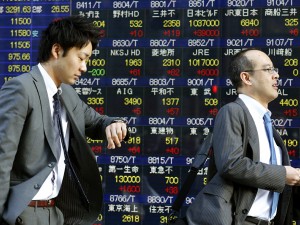
A man looks at his watch while walking in front of an electronic stock indicator in Tokyo in this February 28 file photo. AP
LONDON—US stocks are not alone in racing ahead this year. Many markets in Europe and Asia are trading at multi-year highs, too, in part because of Wall Street’s rally.
The advances in some places have been surprising, given paltry levels of economic growth around the world. Britain’s FTSE 100, for example, enjoyed its best January since 1989 with an increase of more than 6 percent even though the British economy has one foot in another recession.
The FTSE’s advances continued in February, despite concerns that the European debt crisis was about to flare again after a messy Italian election and worries that the US was preparing to turn off the monetary taps sooner than previously thought.
Many explanations have been given for 2013’s roaring start, notably the relief over a US budget agreement that avoided sending the world’s largest economy over the “fiscal cliff” of automatic tax increases and spending cuts that threatened to drag it back into recession.
Several other factors are also at play: The future of the euro appears more secure than it has been for much of the past three years. There are rising hopes that Asia will give global growth another lift. The slowdown in China, the world’s No. 2 economy, seems to have leveled. And a new government in Tokyo has made revival of the moribund Japanese economy its top priority.
But nagging doubts persist, leading some to conclude that the prosperity is too good to be true.
The world “is a fundamentally riskier place than consensus and the confident prognostications of politicians, analysts and central bankers would have us believe,” said Mike Ingram, a market analyst at BGC Partners in London.
Markets are open “to a considerable amount of event risk” and could be heading for a longer-lasting downturn, he said.
Using their power to create money by fiat, central banks, notably the US Federal Reserve, have responded to the greatest economic crisis since the Great Depression by bathing economies in new money.
This fresh liquidity has filtered back into financial markets, helping many of the world’s stock indexes double in value since the low points of early 2009, despite a still-fragile global economic recovery.
But what happens when the taps are turned off and central banks start taking some of their largesse back? Some experts think the rally in stocks is built on sand and will crumble once the unprecedented support measures are withdrawn.
“Markets are facing more uncertainty in policy and monetary policy, which of course encourages caution,” said Herve Goulletquer, head of global markets research at Credit Agricole CIB in Paris.
On February 20, markets tanked on the news that some policymakers at the Fed were concerned over the central bank’s super-easy monetary policy.
Others think central banks will remain in crisis mode for a long time, given the amount of debt — both household and government — that needs to be paid back in coming years.
If the monetary largesse remains, stocks may continue to shine, analysts say, especially since the returns on bonds in the US, Germany and Japan are bordering on insignificant. Why invest in an asset that may deliver 2 percent at best?
As of Tuesday, here’s how some indexes in Europe and Asia are performing:
- Germany’s DAX is approaching its all-time high of 8,106 achieved in July 2007, just before the US housing market started to unravel. Trading at around the 7,800 mark, it’s up around 12 percent over the past year, even though Europe’s largest economy contracted in the final quarter of 2012 from the previous quarter.
- Britain’s FTSE 100 has pushed above 6,400 for the first time in five years, despite fears that the country is about to sink into its third recession in five years. Since the Bank of England started pumping money into the economy in 2009, the index has raced ahead by around 90 percent. However, it’s still short of the peak of 6,930 it hit in 2000 at the height of the dot-com bubble.
- Greece’s main stock index more than doubled over the last few months to surpass the 1,000 mark, then dropped back slightly to around 970. Greece’s continued use of the euro currency appears more secure following agreements to hand the country more bailout cash. However, its peak above 5,000 looks a distant prospect and highlights the country’s fall over the past few years.
- Japan’s Nikkei 225 has shot up to a five-year high above 11,500 as traders hope the weakening yen will improve the earnings prospects of its powerhouse exporters. A new government under Prime Minister Shinzo Abe has made pulling Japan out of its two-decade stagnation its top priority. Still, any investor who put money into Japanese stocks 20 or so years ago is still ruing that decision. The Nikkei is around half where it was in the 1990s.
- Hong Kong’s stock market — which lists Chinese behemoths like the Industrial & Commercial Bank of China, the world’s biggest bank by market value, has posted respectable gains. But the Hang Seng index is nowhere near the milestone that the Dow has reached. It is some 9,000 points off its historical high of nearly 32,000, hit in late 2007.
- Most of the smaller indexes in Asia have pushed higher, too. Thailand’s SET is up around 40 percent in the last 12 months. The PSE benchmark in the Philippines — where remittances from overseas workers and a burgeoning outsourcing industry have insulated the economy — has soared 35 percent in the past year.